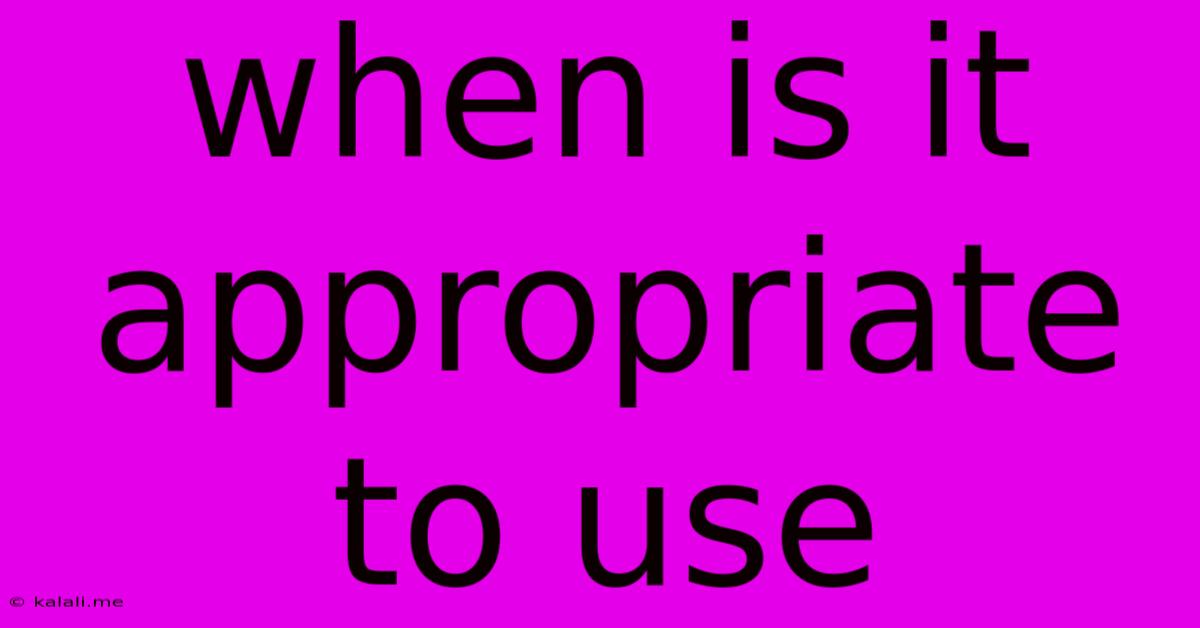When Is It Appropriate To Use
Kalali
Jun 07, 2025 · 3 min read

Table of Contents
When Is It Appropriate to Use "When"?
This article explores the multifaceted uses of the word "when," a seemingly simple conjunction that holds significant grammatical weight and influences the overall meaning of a sentence. We'll delve into its various functions, providing clear examples to illustrate its appropriate usage in different contexts. Understanding "when" correctly will elevate your writing clarity and precision.
What is "When"?
"When" is a subordinating conjunction that introduces adverbial clauses of time. It signifies a point or period in time in relation to the main clause. However, its application extends beyond simple time indicators, influencing sentence structure and meaning in subtle but significant ways.
Common Uses of "When"
-
Indicating Time: This is the most basic function. "When" specifies the time something happens.
- Example: I'll call you when I get home. (Indicates a future time)
- Example: When I was a child, I loved to play outside. (Indicates a past time)
- Example: When the bell rings, the class will end. (Indicates a future time triggered by an event)
-
Introducing a Causal Relationship (Implied): While primarily a time indicator, "when" can subtly imply a cause-and-effect relationship.
- Example: When the pressure builds, the system fails. (Implies that the pressure build-up causes the system failure).
- Example: When he saw the accident, he called 911. (Implies that seeing the accident motivated the call).
-
Expressing Conditional Relationships (Often with "if"): Although "if" is more direct, "when" can be used to express conditions, particularly when the condition is highly probable.
- Example: When you finish your work, you can go home. (Implies a strong likelihood of finishing the work). This is subtly different from If you finish your work..., which allows for a less certain outcome.
-
In Questions: "When" is frequently used to ask about the time something happened, will happen, or is happening.
- Example: When will the meeting begin?
- Example: When did you last see him?
- Example: When does the train depart?
Distinguishing "When" from Other Time Words:
It's important to differentiate "when" from similar words like "while," "as," and "since."
- While: Emphasizes the duration of an action happening concurrently with another. While I was cooking, the phone rang.
- As: Often implies simultaneity or a cause-and-effect relationship more directly than "when." As the sun set, the temperature dropped.
- Since: Indicates a point in time from which an action or state has continued. I've been waiting since 2 PM.
Using "When" Effectively:
To use "when" effectively, ensure it clearly links the time clause to the main clause. Avoid ambiguity by choosing the most precise word for the intended relationship between the clauses. Overuse can make your writing repetitive; vary your sentence structure using alternative words for temporal relationships when appropriate.
Conclusion:
The seemingly simple word "when" offers a range of nuanced applications in English grammar. Mastering its usage, distinguishing it from similar words, and understanding its subtle implications significantly enhances writing precision and clarity. By applying these guidelines, you can confidently and effectively use "when" in your writing.
Latest Posts
Latest Posts
-
Kitchen Sink Drain Rough In Height
Jun 07, 2025
-
Meaning Of Stay In Your Lane
Jun 07, 2025
-
What Does Bible Say About Premarital Sex
Jun 07, 2025
-
Do You Need Specific Rims To Make Your Bike Tubeless
Jun 07, 2025
-
Plug Extension Cord Into Surge Protector
Jun 07, 2025
Related Post
Thank you for visiting our website which covers about When Is It Appropriate To Use . We hope the information provided has been useful to you. Feel free to contact us if you have any questions or need further assistance. See you next time and don't miss to bookmark.